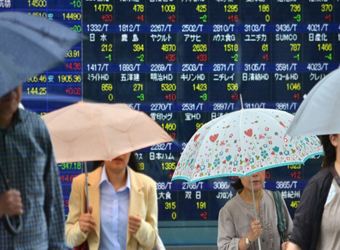Indexes in Asia closed mixed on Friday after North Korea launched a missile in the direction of the east, although market reaction to the event was largely subdued.
The missile flew over Japan before landing 2,000 km east of Hokkaido, Reuters said, citing Japanese broadcaster NHK. Following the North’s latest launch, South Korea has responded by firing its own missile into the sea, according to Reuters.
The hermit state had warned through a state agency on Thursday that it would “sink” Japan, Reuters reported. North Korea had fired another ballistic missile which passed over northern Japan before falling into the sea on Aug. 29 local time.
However, the knee-jerk reaction to buy safe-haven currencies on the news unwound fairly quickly. The dollar rose to 110.68 yen by 3:00 p.m.
HK/SIN after falling as low as 109.54 earlier in the day. The greenback had fetched around 110.28 yen before news of the launch.
The Swiss franc, another safe-haven currency, pared all gains to trade at 0.9636 francs to the dollar after strengthening as high as 0.9610. Gold, often regarded as a safe haven in times of geopolitical uncertainty, climbed as high as $1,334.36 an ounce before paring gains. The yellow metal traded at $1,329.01 by 3:02 p.m. HK/SIN.
Gold, often regarded as a safe haven in times of geopolitical uncertainty, climbed as high as $1,334.36 an ounce before paring gains. The yellow metal traded at $1,329.01 by 3:02 p.m. HK/SIN.
While trade was slightly cautious, the muted reaction from investors was attributed by market watchers to a sense of fatigue.
“It would be wrong to say that markets are not taking any notice, but the relatively muted responses of yen, won and risk assets globally suggests that a sense of fatigue on this belligerence is creeping in” Rob Carnell, Asia head of research at ING, said in a note.
IG strategist Jingyi Pan said the subdued reaction was likely because investors no longer saw the event as an unprecedented threat, given how North Korea had done the same at the end of August.
In equities, South Korea’s benchmark Kospi index, finished the session higher despite coming under pressure earlier in the day. The index reversed losses to climb 0.35 percent higher at 2,386.07.
Defence names closed mixed after rising earlier in the session: Korea Aerospace closed up 1.28 percent, but Victek fell 5.92 percent. Samsung Electronics erased early losses to close 0.2 percent higher.
Japan’s Nikkei 225 shrugged off elevated geopolitical tensions in the region to close up 0.52 percent, or 102.06 points, at 19,909.50.
Down Under, the S&P/ASX 200 shed 0.76 percent to close at 5,695, with the 1.88 percent fall in the materials sub-index weighing on the broader index. The heavily-weighted financials sub-index edged down 0.68 percent.
Greater China markets were mixed. Hong Kong’s Hang Seng Index was off 0.01 percent by 3:00 p.m. HK/SIN while mainland markets made moderate losses. The Shanghai Composite lost 0.53 percent to end at 3,353.6686 and the Shenzhen Composite finished 0.278 percent lower at 1,987.9850.
The MSCI Asia Pacific ex Japan index was off 0.11 percent by 3:08 p.m. HK/SIN.
Elsewhere, markets digested better-than-expected U.S. August consumer prices released on Thursday. The consumer price index rose 0.4 percent in August, a touch above the 0.3 percent increased forecast by economists in a Reuters poll. Some investors speculated that the beat could potentially influence the U.S. Federal Reserve to hike interest rates once more this year.
The Bank of England was also on the radar after it kept interest rates on hold at 0.25 percent, but noted that a withdrawal of monetary stimulus could be required “over the coming months.” The pound traded as high as $1.3406 following the news compared to the $1.32 handle seen before.
Stateside, major indexes closed mixed. The Dow Jones industrial average rose 0.2 percent, or 45.3 points, to close at 22,203.48, but the tech-heavy Nasdaq underperformed, sliding 0.48 percent by the end of the session.
In corporate news, the contest to buy Toshiba’s memory chip unit plodded along. Toshiba said Thursday that Western Digital “persistently overstates” its rights over the Japanese company’s flash memory unit.
Still, Toshiba said in its statement that it was committed to selling Toshiba Memory Corporation by March 2018. Toshiba stock closed up 0.32 percent, as other Japanese tech stocks finished mostly higher after shrugging off North Korea jitters.
Meanwhile, bitcoin nursed its wounds after falling on Thursday when one of the largest exchanges in China announced it would stop all trading on September 30.
The cryptocurrency traded at $3,144.85 at 3:04 p.m. HK/SIN, compared to a record high of $5,013.91 touched earlier in September.
On the energy front, oil prices edged down after rising in the previous session on forecasts for stronger oil demand. Brent crude declined 0.63 percent to trade at $55.12 a barrel after hitting its highest levels in five months on Thursday. U.S. West Texas Intermediate crude slipped 0.7 percent to $49.54.
Source: CNBC


